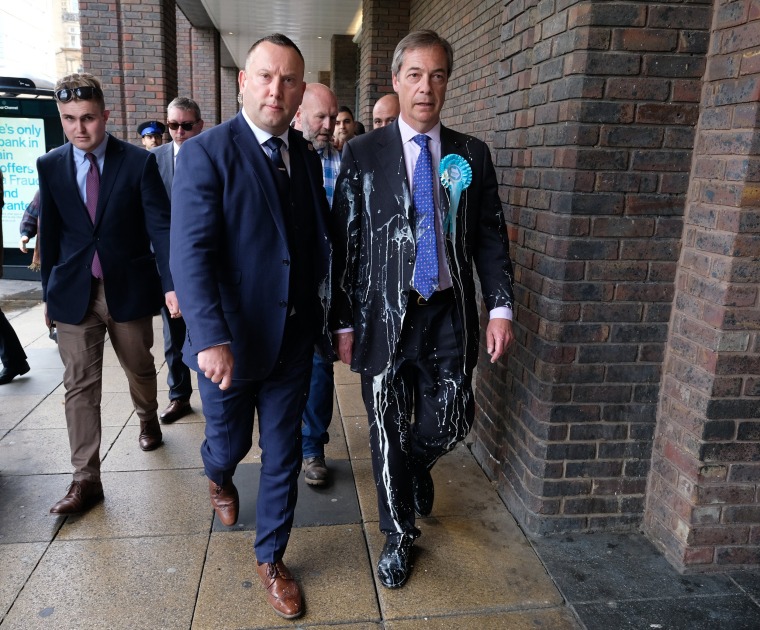LONDON — In normal times, despite political divisions that date back decades, British politics has been marked by civility and a culture of respectful, if not always agreeable, debate.
But in the United Kingdom of Great Britain and Northern Ireland these are not normal times.
With Brexit now dominating almost every element of British politics, something has changed: rhetoric has become less polite and more directly personal, angrier and in some cases extreme.
The divide between Brexiteers, who typically come from the ruling right-wing Conservative Party and the upstart single-issue Brexit Party, and those who still want the U.K. to remain in the European Union, is stark and growing wider.
Some fear that this divide, which now defines political discourse in London, has come to infect the entire political culture.
Ann Widdecombe, a former government minister elected in May to the European Parliament for the Brexit Party, attracted ridicule and disbelief in some quarters by comparing Britons trying to leave the European Union to "slaves" rising up "against their owners."
Her comments were defended by a Conservative lawmaker and fellow Brexit supporter Jacob Rees-Mogg, who said that she was “entitled to use colorful language to get her message across."
“I think that politics requires that,” he added.
In June, Conservative lawmaker Mark Field was filmed bounding out of his chair at a formal dinner and grabbing a female climate change protester around the neck before marching her out of the room.
For some commentators, the incident was indicative of an atmosphere of conflict and the shutting down of debate and dissent.
“The way both sides talk about each other — each month it gets more and more polarized,” Frank Furedi, professor emeritus of sociology at the University of Kent, said. “We can’t have a laid-back discussion anymore, that sensibility is conspicuously absent on both sides of the divide.”
Meanwhile the Labour Party, the left-leaning official opposition, has for years now been embroiled in a scandal over several high-ranking members espousing or failing to criticize incidents of anti-Semitism.
And in June, lawmaker Ed Davey, a senior figure in the anti-Brexit Liberal Democrat Party, proposed in The Times newspaper, “a Remain alliance to decapitate that blond head” if Conservative Party leadership candidate Boris Johnson called an election to deliver Brexit.
Johnson, a blond, became prime minister July 23.
Davey later apologized for his “careless use of language.”
These bad-tempered exchanges are at times matched by physical abuse.
During the campaign for the European Parliamentary elections in May, right-wing and far-right politicians regularly had milkshakes thrown at them during campaign appearances, including Brexit Party founder Nigel Farage.
The assailant, Paul Crowther, 32, was told to carry out 150 hours of unpaid work, and ordered to pay Farage £350 ($424) compensation — the cost of dry cleaning his suit — after he pleaded guilty to common assault and criminal damage.
In June 2016, Britain voted 52 to 48 percent to leave the E.U., a 28-member economic and political bloc. Public sentiment has moved only slightly since then, with the preference for remain now standing at 52 percent with 48 percent for leave, according to polling expert and professor of politics John Curtice.
One big change, however, is the willingness of people on both sides to compromise. In the last six months, people's desire to support a negotiated option has decreased, according to experts.
“People either want to leave without a deal or hold another referendum in the hope that it will come up with another result. Compromises like Prime Minister Theresa May’s deal are struggling to gain popular support,” Curtice said.
While these deep divisions may be new, the seeds were sown well before Brexit.
The grievances, concerns and anxieties that led to Brexit have been around for 10 to 15 years, according to Tereza Capelos, a lecturer in political psychology at the University of Birmingham. Those include growing economic inequality, job insecurity and decreasing public services.
“The more you leave those unaddressed, the more they grow,” she said.
"It's similar to what we’ve seen in the U.S. Instead of seeing people looking toward a future that is uncertain, they look backwards in an effort to appease their anxieties."
Like the United States, Britain has a wealth gap. The richest 10 percent of households hold 44 percent of all wealth, while the poorest 50 percent own just 9 percent, according to the Equality Trust, an organization which aims to reduce inequality.
Meanwhile, child poverty is rising and Brexit is expected to make it even worse. Around 30 percent of children live in poverty, with estimates it could reach almost 37 percent by 2022.
Though it may seem like deep divisions are the new reality, political experts say that there is hope for the return of a more civil and less divided discourse.
“There’s always a way back. The question is how,” said Anand Menon, a politics professor and director of U.K. in a Changing E.U., a research group based at King’s College London. “The answer is you do Brexit.”
